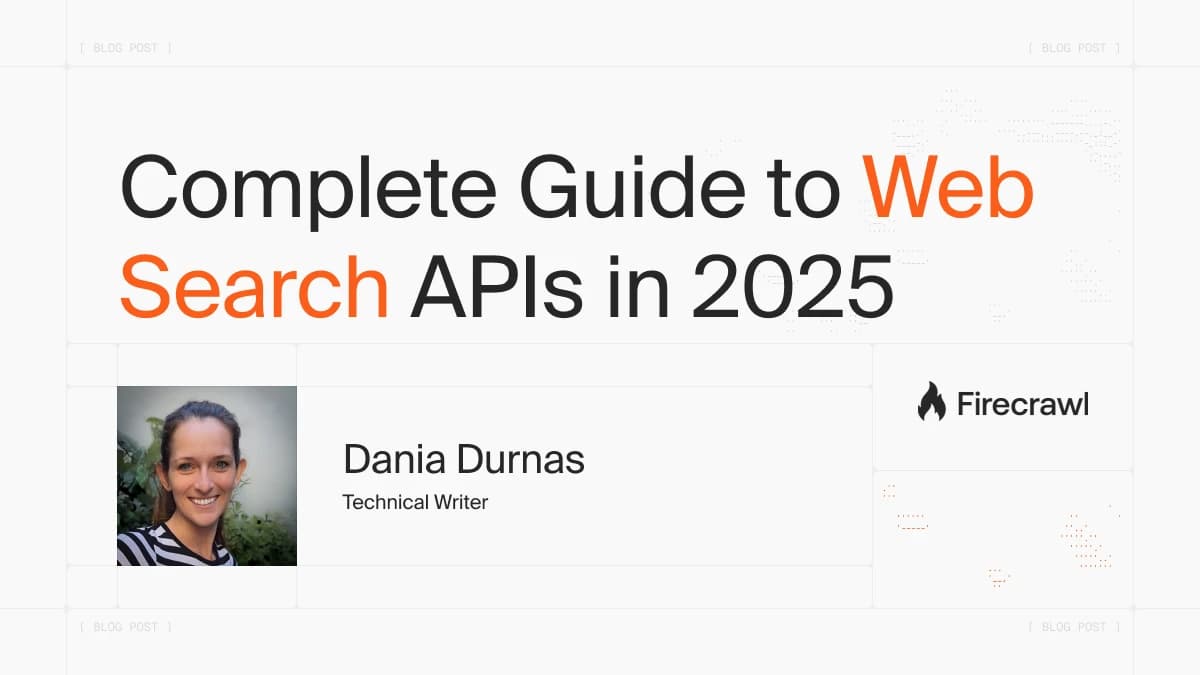
The web search API market has been changing dramatically with AI applications driving demand for smarter search capabilities. With Microsoft's decision to retire Bing Search APIs in August 2025, developers are evaluating web search API alternatives and discovering new platforms built specifically for AI workflows.
Our web search API comparison examines both traditional SERP APIs and AI-native search engines that power modern applications. Whether you need a search API for RAG systems, semantic search for AI agents, or reliable data extraction for business intelligence, choosing the right platform affects performance, functionality, and costs.
This guide covers the top search APIs for developers in 2025, including detailed analysis of pricing, capabilities, and ideal use cases. We'll compare everything from enterprise-grade SerpAPI alternatives to specialized platforms like Firecrawl search, Exa, and Tavily that target specific AI workflows. By the end, we hope you find the web search API works for you and your applications.
Table of Contents
- What is a Web Search API?
- A Comparison of Web Search APIs
- AI-Native Search APIs
- Traditional Web Search APIs
- How do you choose a web search API?
- Takeaways
- Frequently Asked Questions
What is a Web Search API?
A web search API provides programmatic access to search engine results through HTTP requests, returning structured data in JSON or other machine-readable formats instead of visual web interfaces that we use for day-to-day web browsing.
Web search APIs serve specific development use cases:
- AI and machine learning applications consume search results to train models, power chatbots, or enable retrieval-augmented generation systems with clean, structured data that LLMs process efficiently
- Business intelligence tools use search APIs to monitor brand mentions, track competitor content, or analyze market trends across thousands of queries daily
- SEO and marketing platforms automate rank tracking, keyword research, and content gap analysis by querying search engines programmatically
- Research applications gather data from academic sources, news sites, or industry publications at scale
For the sake of this blog, we consider the web search API market as divided into two distinct categories: AI and traditional.
AI-native search APIs like Exa, Tavily, and Firecrawl use neural networks, semantic understanding, or integrated content extraction to deliver information specifically formatted for LLM consumption and AI workflows. These platforms understand context and meaning beyond simple keyword matching. You'll want to use them for RAG systems, AI agents, and applications requiring semantic search capabilities.
Traditional SERP APIs including SerpAPI, ScrapingDog, Serper, and Brave focus on extracting and formatting search engine results from established platforms like Google and Bing (or in the case of Brave, using their own index). These services provide familiar search results for applications that need structured access to traditional search engine data that aren't focused on advanced AI capabilities.
A Comparison of Web Search APIs
| Feature | Firecrawl | Exa | Tavily | SerpAPI | ScrapingDog | Serper | Brave |
|---|---|---|---|---|---|---|---|
| Pricing | $83/100k credits | $1.50/1k searches | $8/1k requests | $75+/5k searches | $0.29-1.00/1k | $0.30-1.00/1k | $3/1k queries |
| Free Tier | Yes | 1,000/month | 1,000/month | 250/month | 1,000 credits | None | 2,000/month |
| Output Formats | JSON, Markdown, HTML, Screenshots | JSON, Structured Data | JSON, Citations | JSON, Rich Metadata | JSON | JSON | JSON |
| Content Extraction | Full page + custom schemas | Page summaries | Key content extraction | Metadata only | Metadata only | Metadata only | Metadata only |
| AI Integration | Native LLM optimization | Neural semantic search | Citation-ready responses | Structured parsing only | Basic JSON output | Basic JSON output | Basic JSON output |
| Search Approach | AI + Traditional | Neural networks | Source-first discovery | Multi-engine SERP | Google SERP | Google SERP | Independent index |
| Integrated Search + Scrape | Yes (single operation) | No | No | No | No | No | No |
| LangChain Support | Yes | Yes | Yes | Yes | Limited | Yes | Yes |
AI-Native Search APIs
The Complete Web Context Engine for AI
Best for: AI agents and applications requiring flexible search discovery with optional full content extraction in integrated workflows
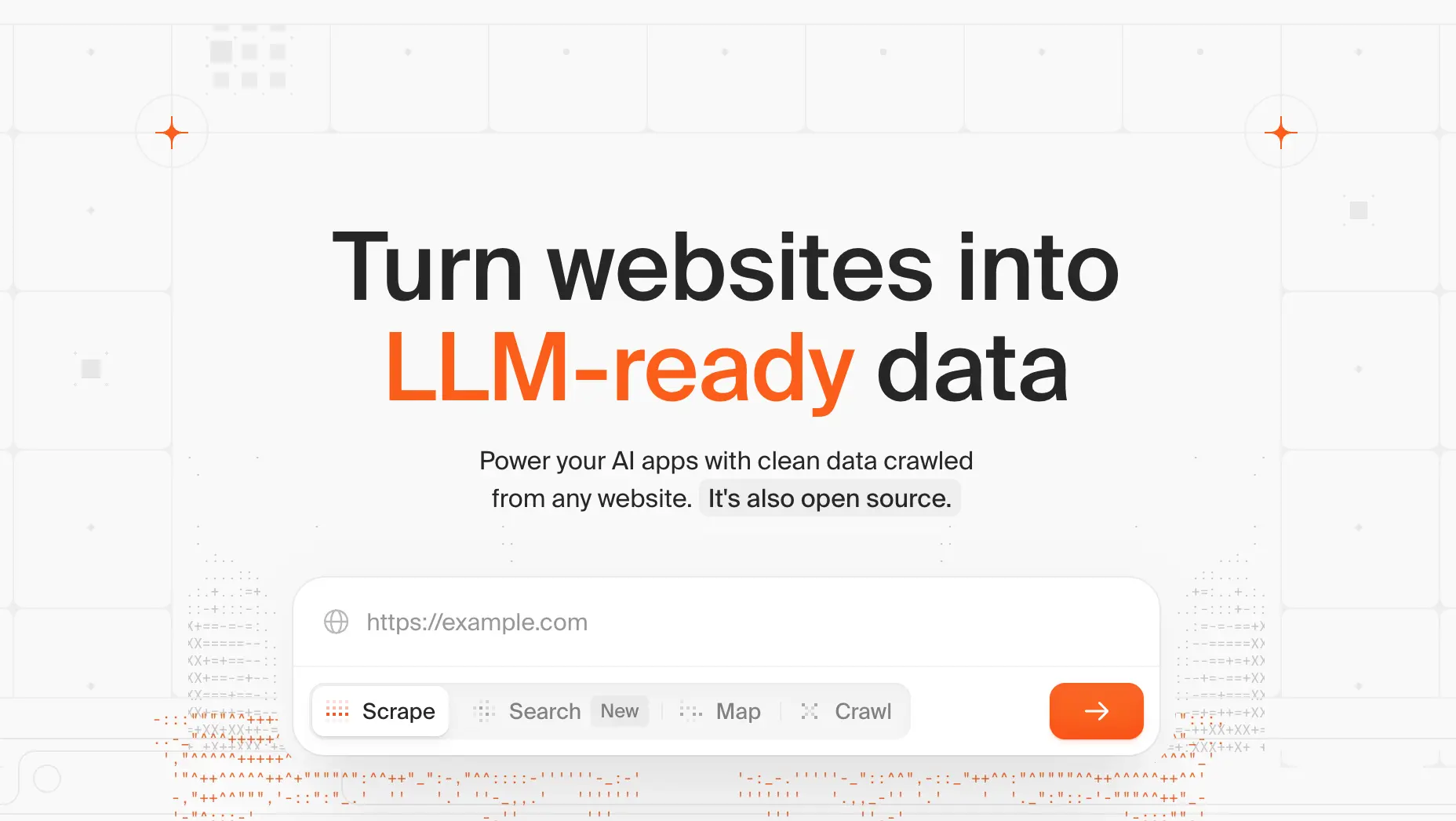
Firecrawl approaches web search from a fundamentally different perspective than standalone search APIs.
Instead of forcing you into a one-size-fits-all workflow, they built a flexible pipeline that can function as a pure search API or seamlessly integrate full content extraction when needed. You can search for relevant pages and get standard metadata, or enable content scraping through a simple scrape_options parameter to extract clean, structured content optimized for AI consumption. Firecrawl eliminates the common workflow bottleneck where developers must chain together separate search and scraping services, losing context and efficiency along the way.
Firecrawl's search capabilities span multiple content types and specialized categories. The platform supports filtering by source type (web, news, images) and specialized categories including github for repository searches, research for academic papers (arXiv, Nature, IEEE, PubMed), and pdf for document searches.
Advanced filtering includes time-based searches (past hour, day, week, month, or custom date ranges), location-based targeting by country, and HD image searches with dimension filtering using Google Images operators like imagesize:1920x1080 or larger:2560x1440.
While other tools require a two-step workflow where you search for pages then separately scrape each URL, Firecrawl lets you optionally go from search query to clean, LLM-ready content without additional infrastructure or API chaining.
Firecrawl is developer-friendly, and you can get started quickly to test it out. With only a few lines, you can start running web searches in minutes.
# Install the Firecrawl Python SDK
# pip install firecrawl-py
from firecrawl import Firecrawl
# Initialize with your API key
firecrawl = Firecrawl(api_key="fc-YOUR-API-KEY")
# Basic search - just metadata (titles, URLs, descriptions)
results = firecrawl.search(
query="AI agent frameworks",
limit=5
)
# Advanced search with content extraction
results = firecrawl.search(
query="AI agent frameworks",
limit=5,
scrape_options={
"formats": ["markdown", "links"]
}
)
# Category-specific search (GitHub repositories)
results = firecrawl.search(
query="web scraping python",
categories=["github"],
limit=10
)
# Time-based search (past 24 hours)
results = firecrawl.search(
query="AI news",
sources=["news"],
tbs="qdr:d",
limit=5
)Pricing transparency: Search costs 2 credits per 10 results. If you enable scraping, standard scraping costs apply (1 credit per page, with additional costs for PDF parsing or stealth mode). This pay-for-what-you-use model ensures you only pay for the features you actually need.
Learn more about Firecrawl's search endpoint and how it simplifies web data workflows. For developers looking to learn about Firecrawl's other powerful endpoints, check out our guides on Firecrawl's scrape endpoint and crawl endpoint.
Pros:
- Flexible architecture: use as pure search API or enable integrated content extraction as needed
- Multiple specialized search categories including GitHub repositories, research papers, and PDFs
- Advanced filtering: time-based searches, location targeting, and HD image dimension filtering
- Clean markdown output optimized specifically for LLM consumption and RAG workflows
- Advanced schema extraction using natural language prompts for structured data
- Production-ready infrastructure that serves major enterprise customers
- Transparent, usage-based pricing—pay only for features you use
Cons:
- Newer platform compared to established alternatives
- Advanced capabilities might be unnecessary overhead for simple search-only applications Best for: AI agents requiring semantic discovery and research dataset curation when searching for AI research content
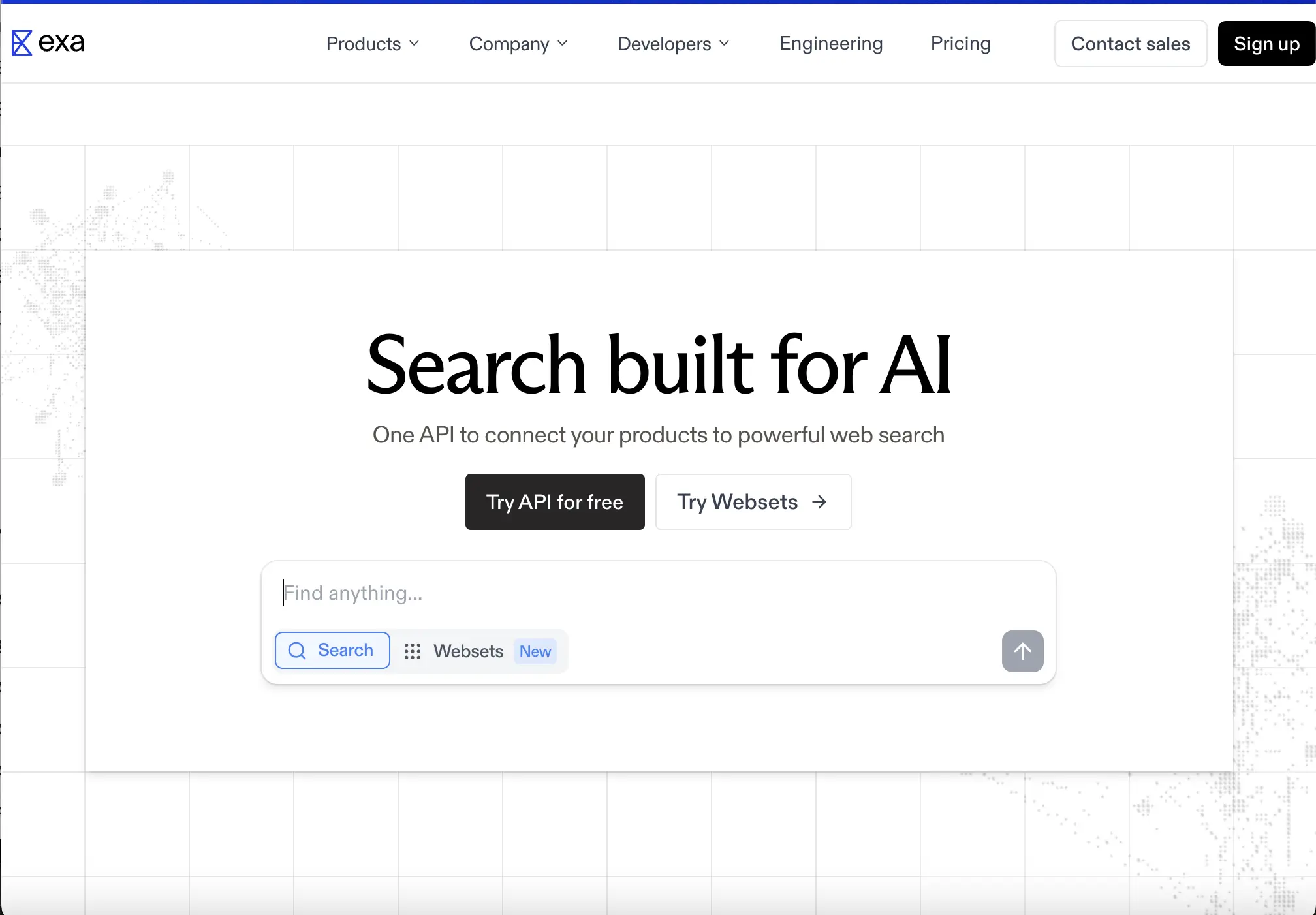
Exa provides a unique and innovative AI-forward web search for researchers. When searching for AI research, they trained neural networks on link prediction to understand how humans actually connect ideas across the internet, and as a result, their search engine grasps semantic relationships.
The difference shows up in results quality. Ask for "breakthrough AI research" and Exa's neural search surfaces top papers by understanding research significance, not just term frequency. Their system learns from how researchers actually link to each other's work, creating a search experience that feels almost intuitive for complex queries.
Exa offers advanced AI-driven search and semantic data extraction capabilities requiring some configuration. These features, while powerful, add layers of complexity compared to straightforward search.
Response times stay under a second even for complex semantic queries, and their real-time indexing adds fresh content within hours. As a research-oriented company, they focus on source quality over volume, so their results may miss commercial or news sources that broader applications need.
Pros:
- Neural networks trained on link prediction deliver true semantic understanding
- AI-native architecture with responses formatted specifically for LLM consumption
- Authoritative source curation emphasizing research-grade content quality
- Sub-second response times with real-time indexing of new content
- Understands research significance and contextual relationships between sources
Cons:
- Exa generally requires more initial setup work than Firecrawl's simpler search API experience
- Smaller search index means less comprehensive coverage than APIs like Firecrawl
- Neural search effectiveness varies unpredictably across different domains and query types
- Limited traditional SERP features for teams expecting conventional search results
The Citation-First Search API
Best for: RAG pipelines and AI agents requiring trustworthy source discovery with built-in credibility assessment when searching for AI citations
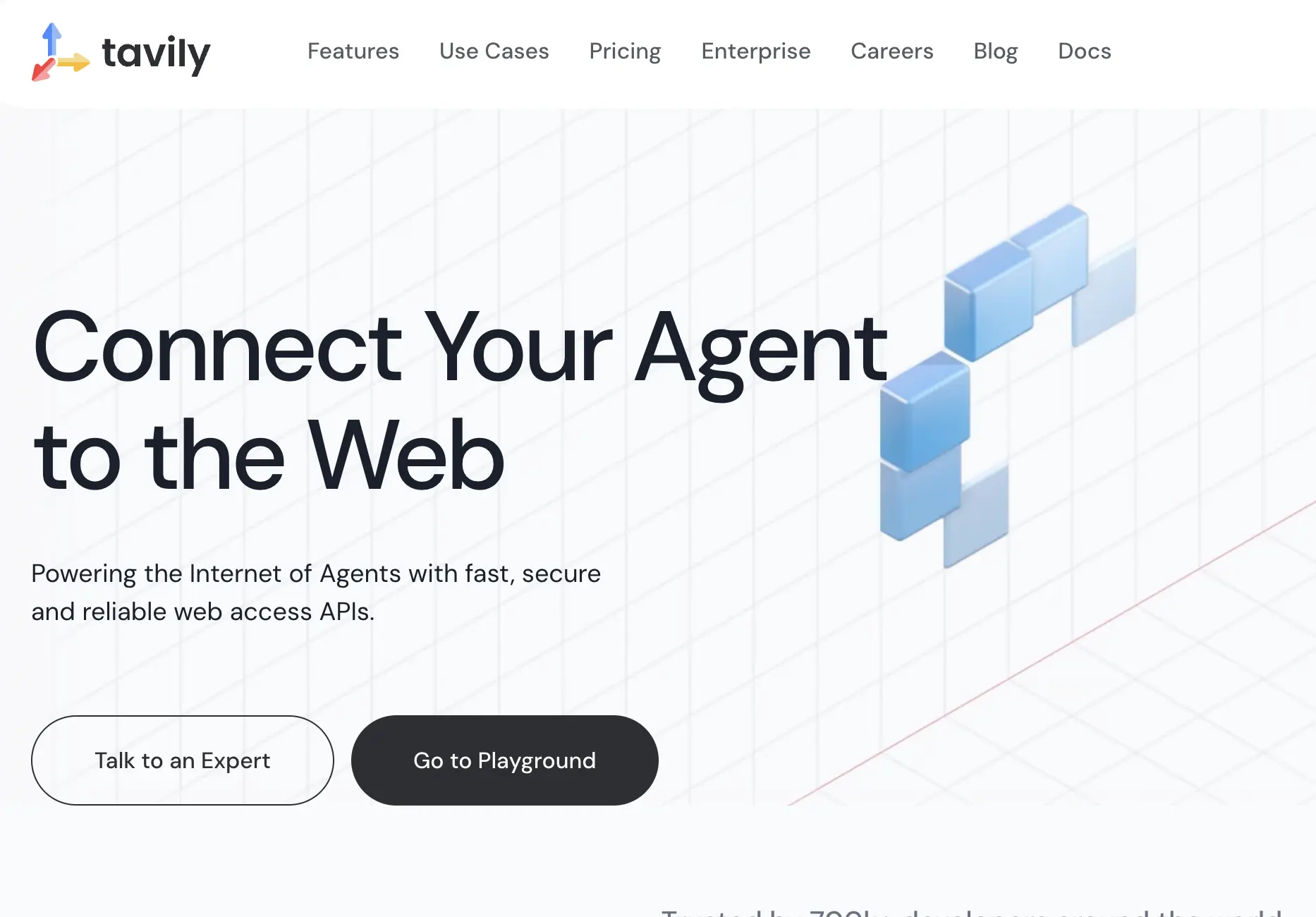
Tavily, another AI web searcher, focuses on surfacing high-quality, citable sources that can immediately ground LLM responses. Think of them as the research librarian of search APIs, prioritizing source authority and citation quality over complete web coverage or advanced semantic matching.
Their architecture centers around what they call "source-first discovery." When you query for recent developments in gene editing, Tavily returns peer-reviewed articles, authoritative news sources, and industry publications with concise summaries and metadata ready for citation.
Unlike integrated platforms like Firecrawl, Tavily focuses purely on search and source discovery. The API provides structured JSON output with citation metadata, but workflows typically require additional processing to extract full content from the discovered sources.
Tavily offers 1,000 free searches monthly, then charges $0.008 per request on a pay-as-you-go basis with no volume minimums. While the per-request pricing is transparent, teams may find the lack of bundled plans less predictable for budgeting than competitors with monthly tiers.
Pros:
- Source credibility assessment built into search results for trustworthy citations
- Fast response times of 0.4-1.2 seconds with high reliability for production workflows
- LangChain and LlamaIndex integrations with comprehensive RAG workflow documentation
- Citation-ready output format with metadata and source provenance for explainable AI
Cons:
- Limited semantic search capabilities compared to neural search engines like Exa or Firecrawl
- Smaller search index means less comprehensive coverage than alternatives
- Focus on source discovery rather than content extraction requires additional tools for full workflows
- Response format optimized for citations rather than full data analysis
Checkout our detailed comparison on Firecrawl vs. Tavily.
Traditional Web Search APIs
The Google-Powered SERP Specialist
Best for: Applications requiring comprehensive Google search coverage with reliable data extraction
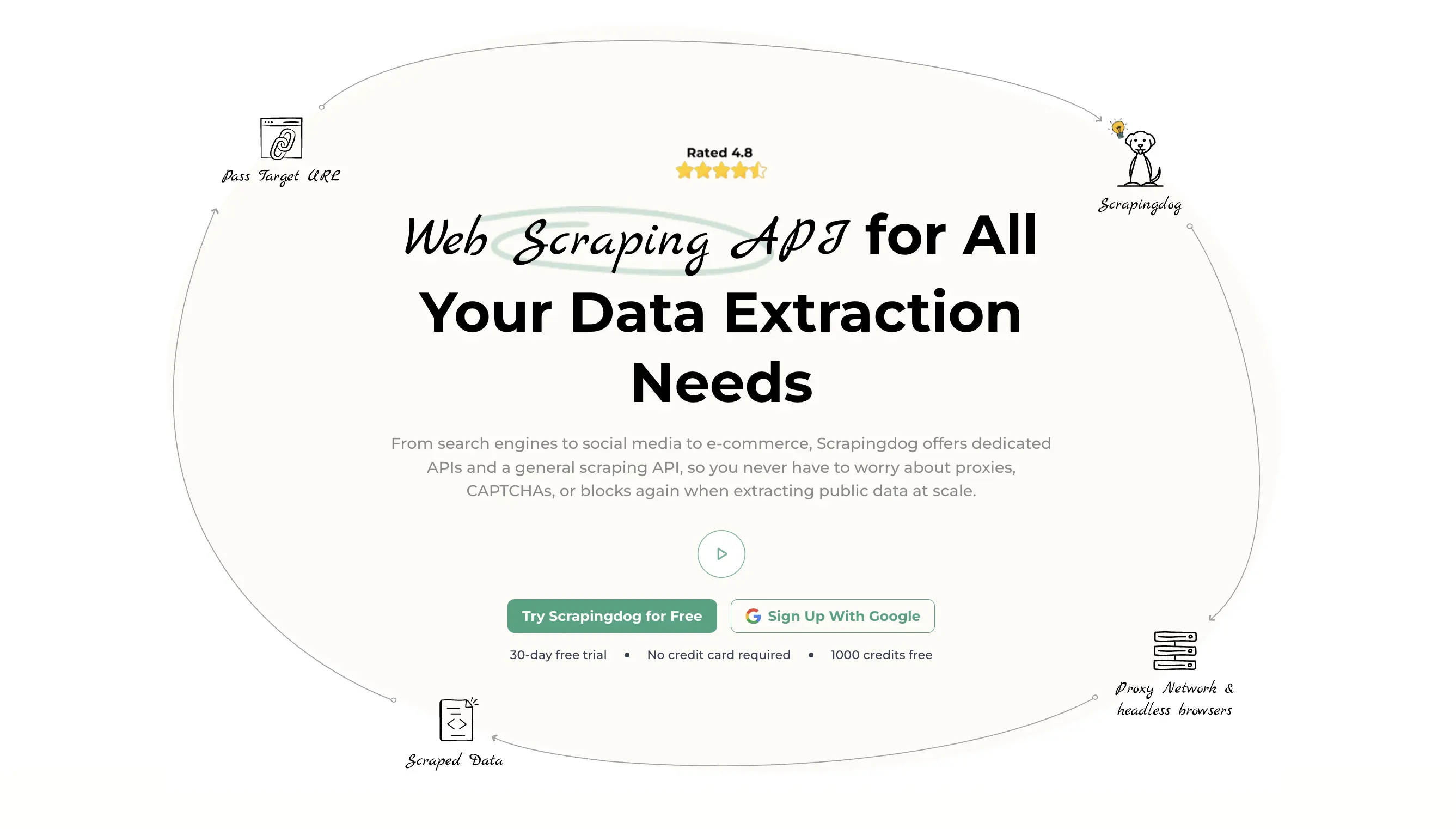
ScrapingDog operates as a specialized intermediary between your application and Google's search results. Rather than building their own search index or developing AI-native capabilities, they focus entirely on one thing: reliably extracting Google's SERP data and delivering it in clean, structured JSON format. You get access to Google's massive search coverage, rich result types, and familiar ranking algorithms without dealing with proxy rotation, rate limiting, or HTML parsing complexities.
Their Google Search API handles the full spectrum of SERP features including organic results, People Also Ask sections, featured snippets, local results, and shopping data.
What sets ScrapingDog apart is their infrastructure focus, rather than algorithm or AI innovation. That means it doesn't have capabilities like semantic search or LLM-optimized outputs. You'll need developers to build additional processing layers for modern AI workflows.
Pros:
- Google search coverage with advanced search parameter support like complex operators and filters
- Competitive pricing from $0.29 to $1.00 per 1,000 searches with generous free tier
- Proven infrastructure handling 400+ million monthly requests
Cons:
- No AI-native capabilities or semantic understanding beyond Google's algorithm
- Only JSON output (requires additional processing)
- Complete dependency on Google's search results (and its terms and conditions) without independent relevance improvements
- Limited to SERP data extraction without full content scraping like other web search API offerings
The Multi-Engine Enterprise Solution
Best for: Large organizations requiring maximum reliability and comprehensive search engine coverage across multiple platforms
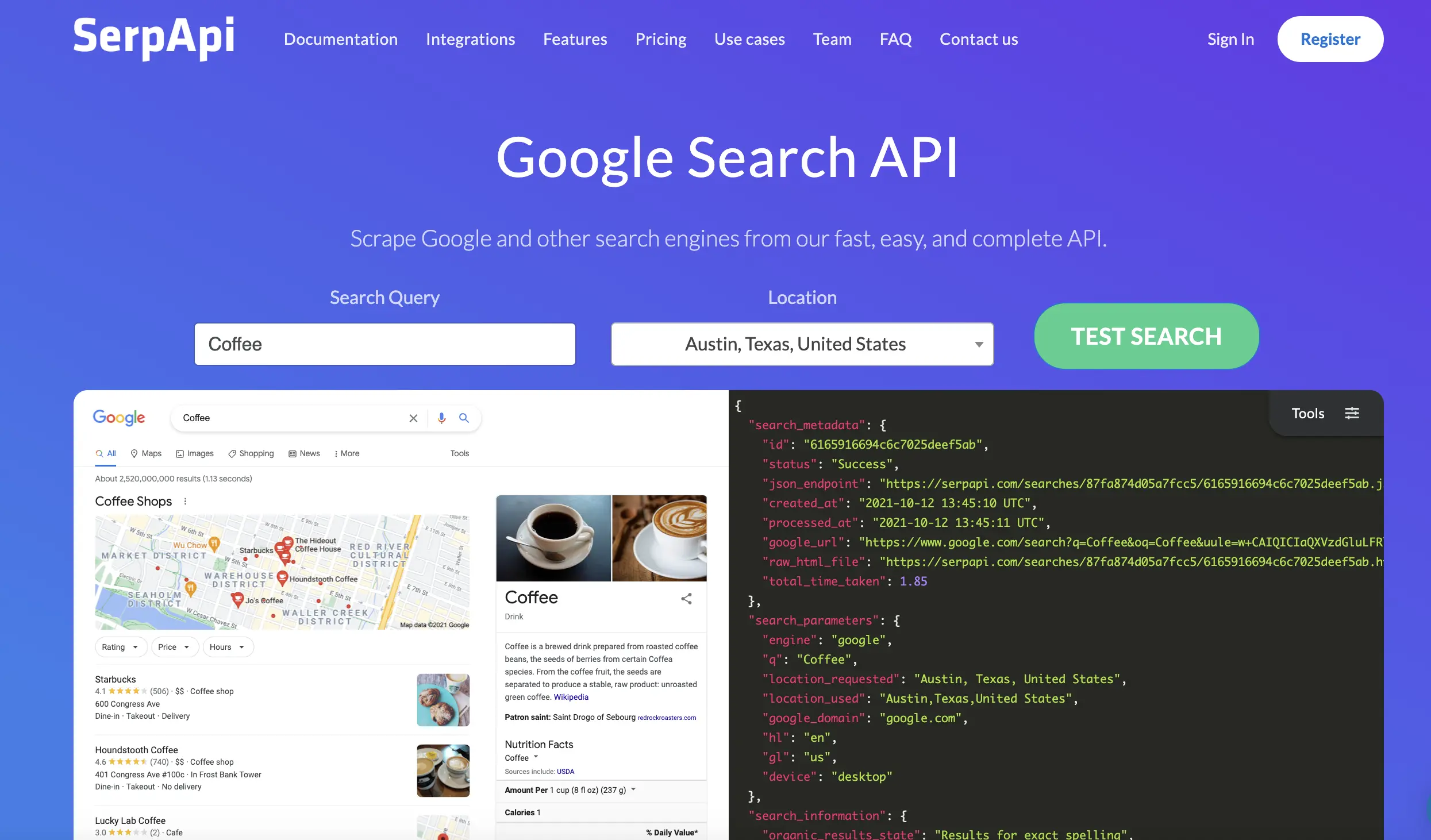
SerpAPI operates as the wrapper service for search engine data, providing unified access to over 40 different search engines and platforms through a single integration. Rather than building separate connections to Google, Bing, Yahoo, DuckDuckGo, Baidu, Yandex, Amazon, Yelp, and dozens of other services, developers can access all of them through SerpAPI's standardized JSON interface.
However, SerpAPI's scope doesn't cover the full needs for modern AI applications. The service returns only search result metadata including titles, snippets, and links rather than full page content. If you need content for LLM processing, you'll have to build additional infrastructure to fetch URLs, convert HTML to text, and handle content extraction separately.
SerpAPI is also very expensive compared to all the alternatives. Combined with premium pricing starting at $75 monthly for 5,000 searches and scaling to $275 for 30,000 searches, the service targets enterprise customers who value reliability guarantees, multi-engine flexibility, and premium cost customer support.
Pros:
- Enterprise-grade reliability with 99.9% uptime SLA and verified real-time data delivery
- High-performance architecture supporting up to 100 requests per second with global infrastructure
- Exceptional customer support with responsive technical assistance through in-product chat
Cons:
- Premium pricing that's 10-50x more expensive than focused search API alternatives
- Requires additional development to build content extraction pipeline for LLM workflows
- Multi-engine complexity may be overkill for applications needing only basic Google search
- Limited to predefined SERP formats rather than comprehensive web data extraction capabilities
The Affordable SERP Middle Ground
Best for: Developers seeking cost-effective Google search access without enterprise complexity
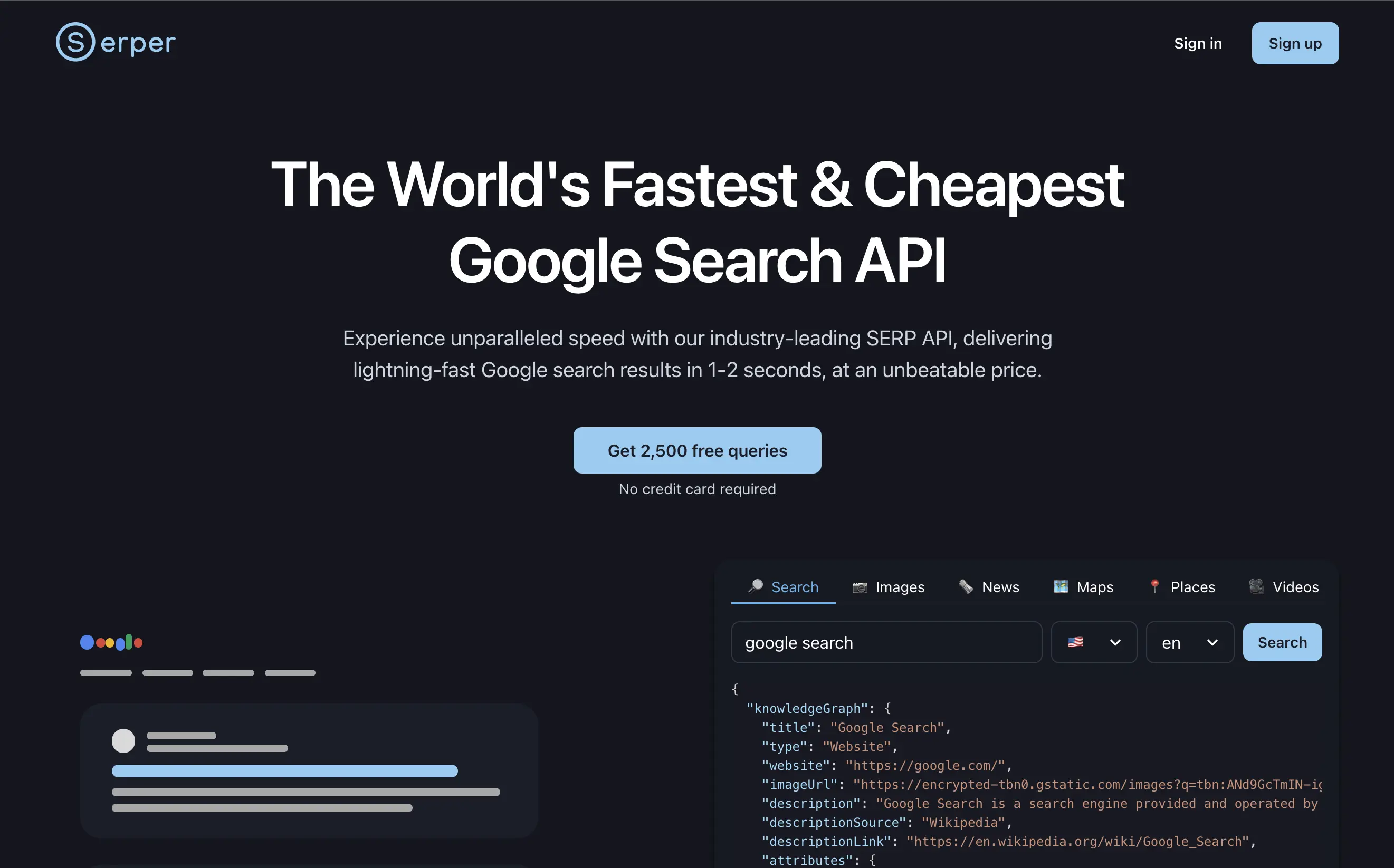
Serper positions itself between budget and premium SERP API options, offering straightforward Google search results through a clean REST API. Rather than competing on advanced features or multi-engine support, they focus on delivering reliable Google search data at volume-friendly pricing that scales with usage. The service targets developers who need more than basic SERP scraping but don't require the larger feature sets of enterprise tools.
Serper emphasizes partnerships and framework integrations over direct developer outreach. For example, their documentation appears less accessible than some competitors (serper.dev/docs doesn't exist). Serper has lots of AI integrations, such as LangChain, so you might have an easier time accessing it through those partner tools.
Pros:
- Volume-friendly pricing scaling from $1.00 to $0.30 per 1,000 searches for large users
- Simple API structure with clean REST endpoints and standard search parameters
- Google search results with familiar SERP data including organic results and metadata
- Focus on reliability over feature complexity appeals to straightforward use cases
Cons:
- No free tier for testing compared to generous trial offers from competitors
- Limited publicly accessible documentation creates integration uncertainty
- Fewer advanced features compared to comprehensive platforms like SerpAPI
- Google dependency creates potential service disruptions if Google's policies change
The Privacy-Focused Alternative
Best for: Research applications, business intelligence monitoring
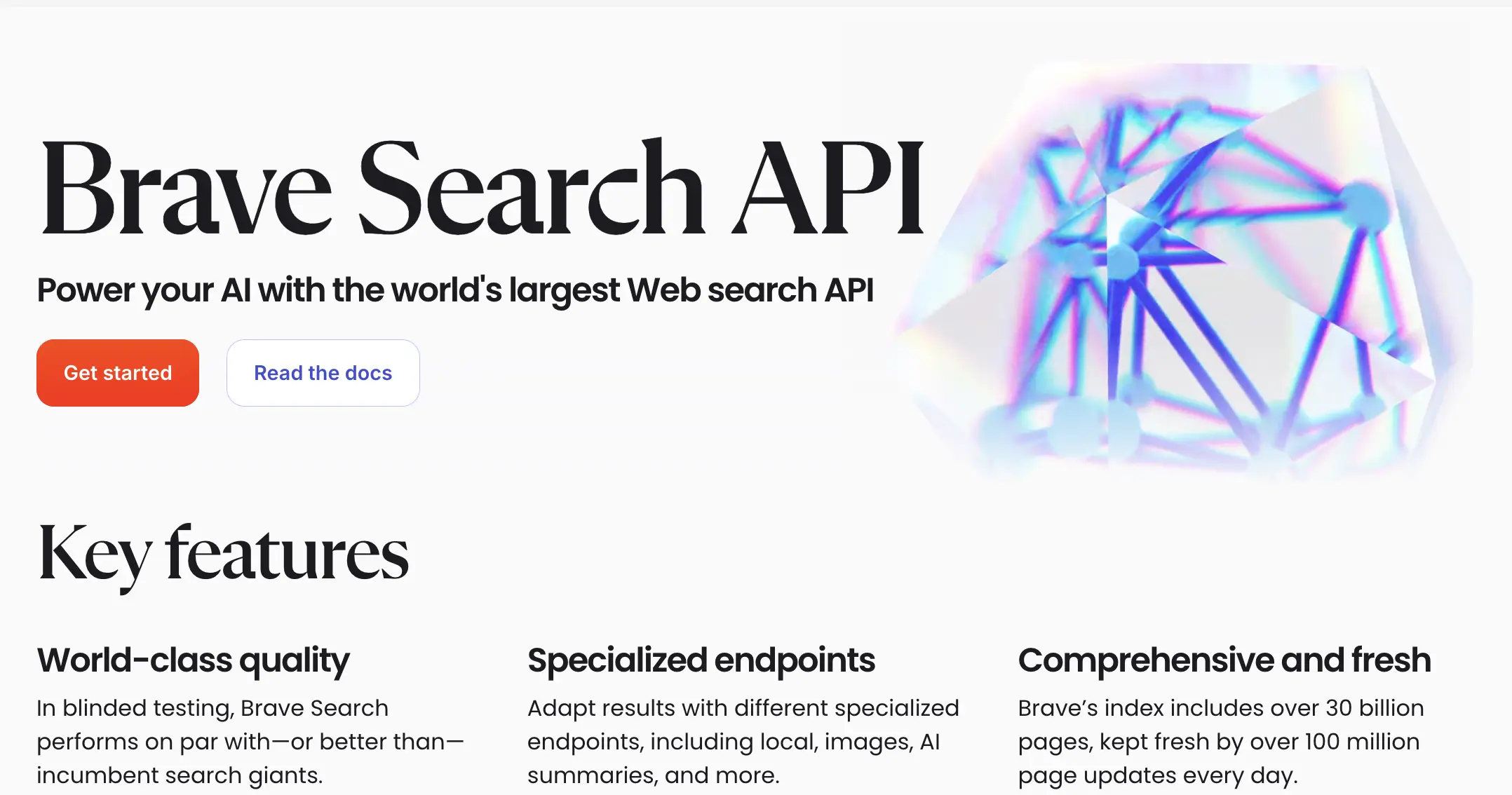
Brave Search API runs on an independent search index that doesn't rely on Google's infrastructure or tracking systems. The company, known and loved for their commitment to user privacy, built their own web crawler and search algorithms to give developers access to search results without the use of surveillance-based business models. Brave Search doesn't collect data during API usage, so it can be useful for healthcare applications, financial research, government projects, or any scenario where query confidentiality is important.
Brave does have some notable limitations, however. It has a smaller search index than Google or others, which means less comprehensive results for niche topics or very recent content. Unlike AI-native platforms like Exa or Firecrawl, Brave Search focuses on traditional keyword-based search without semantic understanding or LLM-optimized outputs.
Pros:
- No user tracking or data collection during API usage
- Independent search index free from Google dependency
- Competitive $3 per 1,000 queries pricing for AI applications
- Generous 2,000 queries monthly free tier for testing
Cons:
- Smaller search index means less coverage than Google-powered APIs
- Limited relevance for niche topics or very recent content
- Rate limits may be restrictive for high-volume applications (1 req/sec baseline)
How do you choose a web search API?
Consider the following criteria when choosing your web search API:
Search approach and data quality: The web search API should align with your application's needs. Traditional SERP APIs tend to deliver Google's familiar ranking algorithms, which is good for applications requiring specific SERP features like Knowledge Graph data. AI-native search APIs excel at semantic understanding or research discovery but may have smaller indices or different relevance models than users expect from Google-powered results.
Integration complexity: APIs with strong LangChain support reduce implementation complexity for AI developers, so teams can prototype faster and switch between search providers without rewriting all of their integration code. Conversely, platforms requiring custom infrastructure or complicated authentication can slow teams down.
Vendor lock-in risks: Independent search APIs provide protection against sudden platform changes or forced migrations to pricey and bloated enterprise ecosystems. When choosing a tool, check whether it could restrict access, change pricing models, or force you into using specific platforms in the future.
Content extraction capabilities: Some APIs return only search metadata, while integrated platforms combine search discovery with content extraction get rid of this complexity. Consider the needs of your entire workflow rather than just the search functionality component.
Takeaways
When it comes to web search APIs, integrated platforms have clear advantages over traditional search-then-scrape approaches, and AI-native platforms are increasingly outpacing traditional SERP APIs for modern development workflows.
Choose platforms that align with where AI development is going rather than trying to adapt legacy search approaches to modern requirements. If you're building AI agents or RAG systems, you have to be even choosier with your search API.
Firecrawl's integrated search and extraction approach solves the fundamental problem of getting from search query to usable content without building custom infrastructure. The combination of intelligent discovery with clean content extraction represents the direction the market is heading, delivered at competitive pricing that often provides better value than combining separate services to create a workflow.
Traditional SERP APIs remain viable for specific scenarios but require additional development overhead that AI-focused platforms take care of by default. The cost savings of metadata-only APIs disappear when factoring in the infrastructure needed for content extraction that AI workflows typically require (and in the case of SerpAPI, you're already paying premium prices just to search!).
The future of infrastructure is AI-first, and your web search partner should be too.
Frequently Asked Questions
What's the difference between SERP APIs and Search APIs?
SERP APIs specifically scrape and reformat data from existing search engines like Google or Bing. They act as middleman services that parse search engine results pages and return structured JSON data. Examples include SerpAPI, ScrapingDog, and Serper.
Search APIs is the broader category that includes both SERP scrapers and independent search engines. This encompasses SERP APIs plus platforms that built their own search indices and algorithms, like Exa's neural search, Brave's privacy-focused engine, or Firecrawl's web context platform. All SERP APIs are Search APIs, but not all Search APIs are SERP APIs.
How do AI-native search APIs work differently from traditional search?
Traditional search APIs match keywords and return results based on text similarity and popularity signals. AI-native search APIs like Exa and Tavily use neural networks to understand semantic meaning and context. When searching for AI content, they can find relevant information even when it doesn't contain your exact search terms, and they format results specifically for AI consumption rather than human browsing.
What happened to Bing Search APIs in 2025?
Microsoft shut down Bing Search APIs on August 11, 2025, pushing users toward their Azure AI Agents platform with "Grounding with Bing Search." Developers currently using Bing's APIs need to migrate to alternatives. Developers likely want to consider independent search providers that aren't subject to sudden platform changes from major tech companies.

data from the web